Playing the Victim

Understanding the Complex Dynamics of Playing the Victim
Playing the victim is a multifaceted behavior that can serve as both a coping mechanism and a manipulation tactic. While genuine victimhood stems from real hardship, the act of playing the victim involves exaggeration or fabrication of circumstances to gain sympathy, avoid accountability, or manipulate others. Recognizing the difference is crucial in addressing relational and emotional challenges. This article explores what playing the victim entails, the behaviors associated with it, psychological causes, and effective ways to respond or change this pattern.
Defining 'Playing the Victim' and Its Recognition
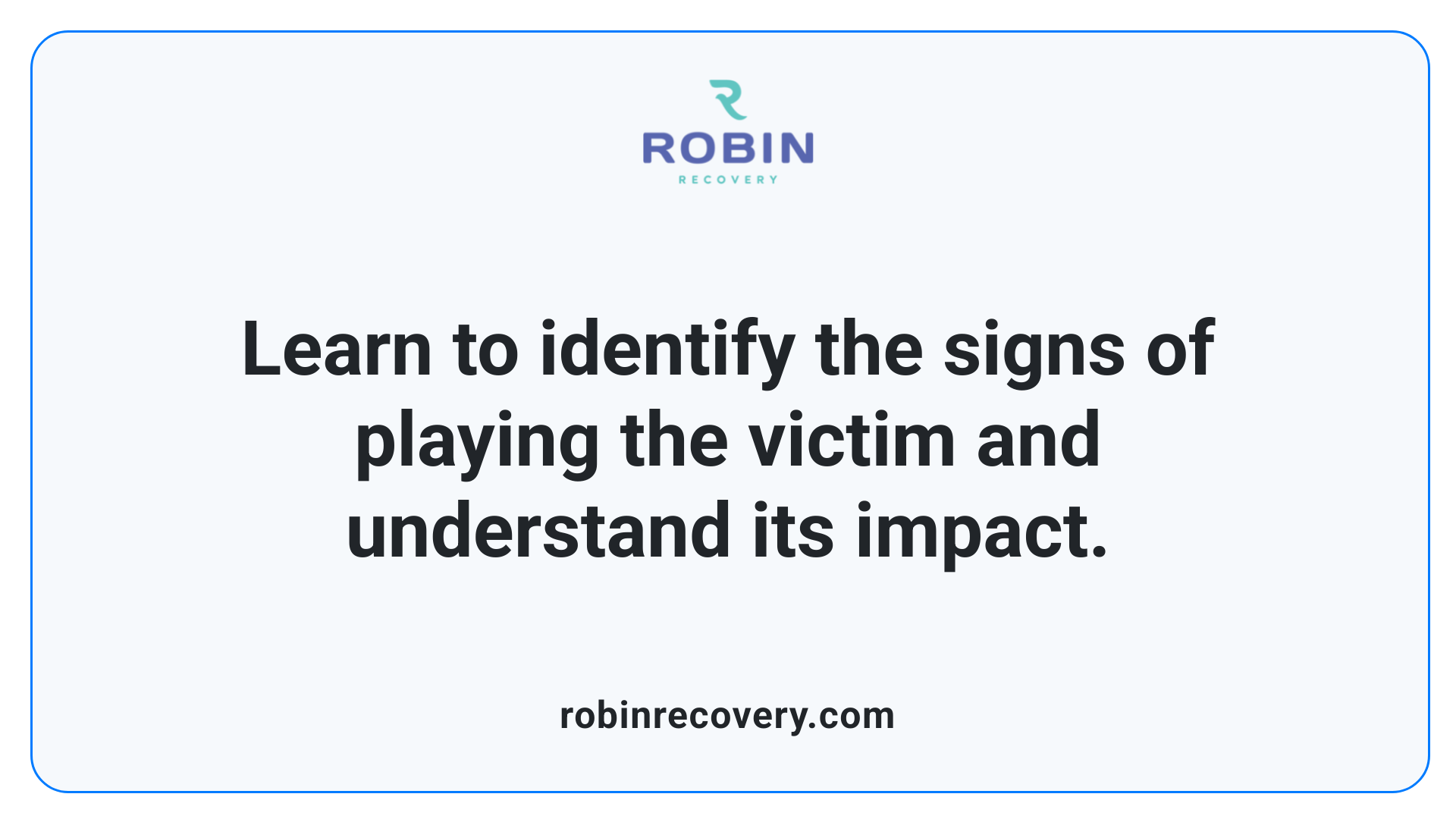
What does 'playing the victim' mean, and how can it be recognized?
Playing the victim involves portraying oneself as a victim, often to seek sympathy, justify harmful behaviors, or manipulate others. This behavior can include fabricating or exaggerating events and feelings to avoid accountability and elicit guilt or pity from others. Recognizing this pattern involves observing certain signs and behaviors.
Common signs of playing the victim include persistent blaming of others for personal hardships, refusal to accept responsibility for one's actions, and making complaints that are not accompanied by efforts to find solutions. Victim players often display a 'woe is me' attitude, feel targeted or persecuted, and tend to compare their misfortunes negatively with others.
This behavior is closely related to victim mentality—a chronic belief that life is unfair and that one is powerless, often rooted in past trauma or childhood experiences. Victim mentality can lead to stagnation and emotional distress, as individuals may refuse help or avoid addressing their issues.
It is important to distinguish authentic vulnerability from manipulative victim playing. True openness involves sharing feelings honestly, seeking understanding, and being receptive to empathy without evading responsibility or seeking to manipulate.
Understanding the difference helps in managing relationships and encourages healthier communication. Recognizing the signs and motives behind victim playing allows for appropriate responses, such as setting boundaries or offering support through genuine empathy, rather than enabling manipulative patterns.
Common Signs and Behaviors in Playing the Victim
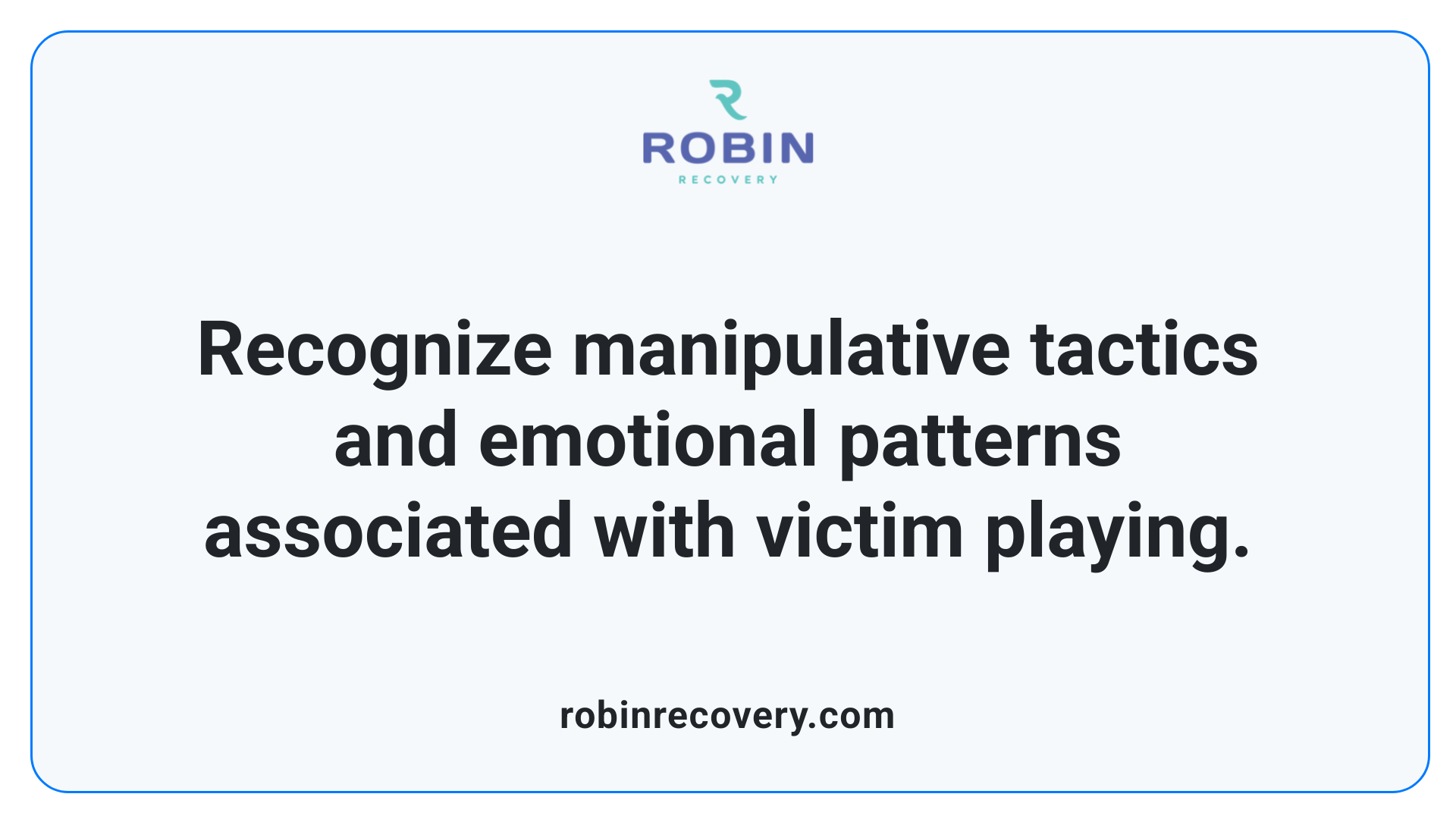
Observable signs and behaviors
People who play the victim often display certain recognizable patterns. They tend to blame others for their hardships, refusing to accept personal responsibility even when evidence suggests otherwise. For instance, they may frequently complain about how life treats them unfairly or portray themselves as being constantly targeted by others. These individuals often engage in catastrophizing, exaggerating small issues, and magnifying others’ mistakes while minimizing their own faults.
They also tend to become defensive when faced with criticism or feedback, perceiving it as an attack. Instead of problem-solving, they ruminate on their misfortunes, which keeps them stuck in a cycle of helplessness. Complaining, self-pity, and an obsession with their hardships are common behaviors. Additionally, they may manipulate others by seeking sympathy, attention, or reassurance, often by externalizing their pain or presenting their problems as uniquely severe.
Another observable trait is their tendency to reject empathy from others, insisting that their suffering is greater than that of others. This behavior reinforces their role as a victim and often isolates them from constructive support or solutions.
Manipulative tactics
Victim players often employ specific manipulation techniques to garner sympathy or avoid blame. This includes constant self-comparison to others’ misfortunes, which can evoke guilt in others and make social interactions one-sided. They might also use emotional appeals, such as crying or other dramatizations, to shift focus onto their suffering.
Gaslighting is a common tactic, where they deny their actions or minimize their role to make others feel at fault. This can be part of broader game-playing strategies, such as DARVO (Deny, Attack, and Reverse Victim and Offender), used to deflect accountability.
Some also keep secrets or distort the truth to protect themselves or to ensure they remain the focus of attention. This manipulation not only distances them from genuine connection but also sustains their victim narrative.
Emotional patterns
Emotionally, those who play the victim often exhibit a ‘woe is me’ attitude. They feel persecuted, targeted, and misunderstood, which can lead to feelings of powerlessness and insecurity. Their internal world is frequently dominated by self-pity, bitterness, and resentment, preventing them from moving forward.
These individuals often struggle to cope with setbacks in healthy ways, instead resorting to blame-shifting and avoidance. Their emotional landscape may include hyper-sensitivity to criticism and an exaggerated response to perceived slights. They are usually attracted to relationships or environments where their victim status garners sympathy and attention, reinforcing their victim identity.
By recognizing these signs and behaviors, it becomes easier to address and set boundaries with those who habitually play the victim, fostering healthier interactions and encouraging accountability.
Typical Examples of Playing the Victim in Action

What are some examples of playing the victim?
Examples of playing the victim can be observed in both personal and professional settings. One common manifestation is blaming others for failures or hardships, refusing to acknowledge personal responsibility. For instance, someone might repeatedly claim that their difficulties are solely the result of other people's actions or unfair circumstances.
Another example involves exaggerating problems or catastrophizing situations to elicit sympathy. A person might blow minor conflicts out of proportion, portraying themselves as unfairly targeted or persecuted. This behavior often serves to manipulate others into offering support or avoiding accountability.
People who play the victim tend to perceive their lives as plagued by constant misfortune. They may interpret unrelated events as personal attacks, leading to a sense of being singled out or unfairly treated. Using past traumas or ongoing struggles as justification, they might excuse harmful behaviors or avoid facing their own role in conflicts.
This pattern also includes holding grudges over perceived injustices, seeking attention through dramatic reactions, or constantly comparing themselves negatively to others. These tactics are aimed at drawing sympathy, gaining control in relationships, or deflecting responsibility.
Understanding these behaviors helps in recognizing when someone is playing the victim, which is often motivated by a desire to manipulate outcomes or evade accountability. Such behaviors can hinder personal growth and strain relationships, making awareness and boundaries essential for healthy interactions.
Distinguishing Genuine Victims from Manipulative Victim Play
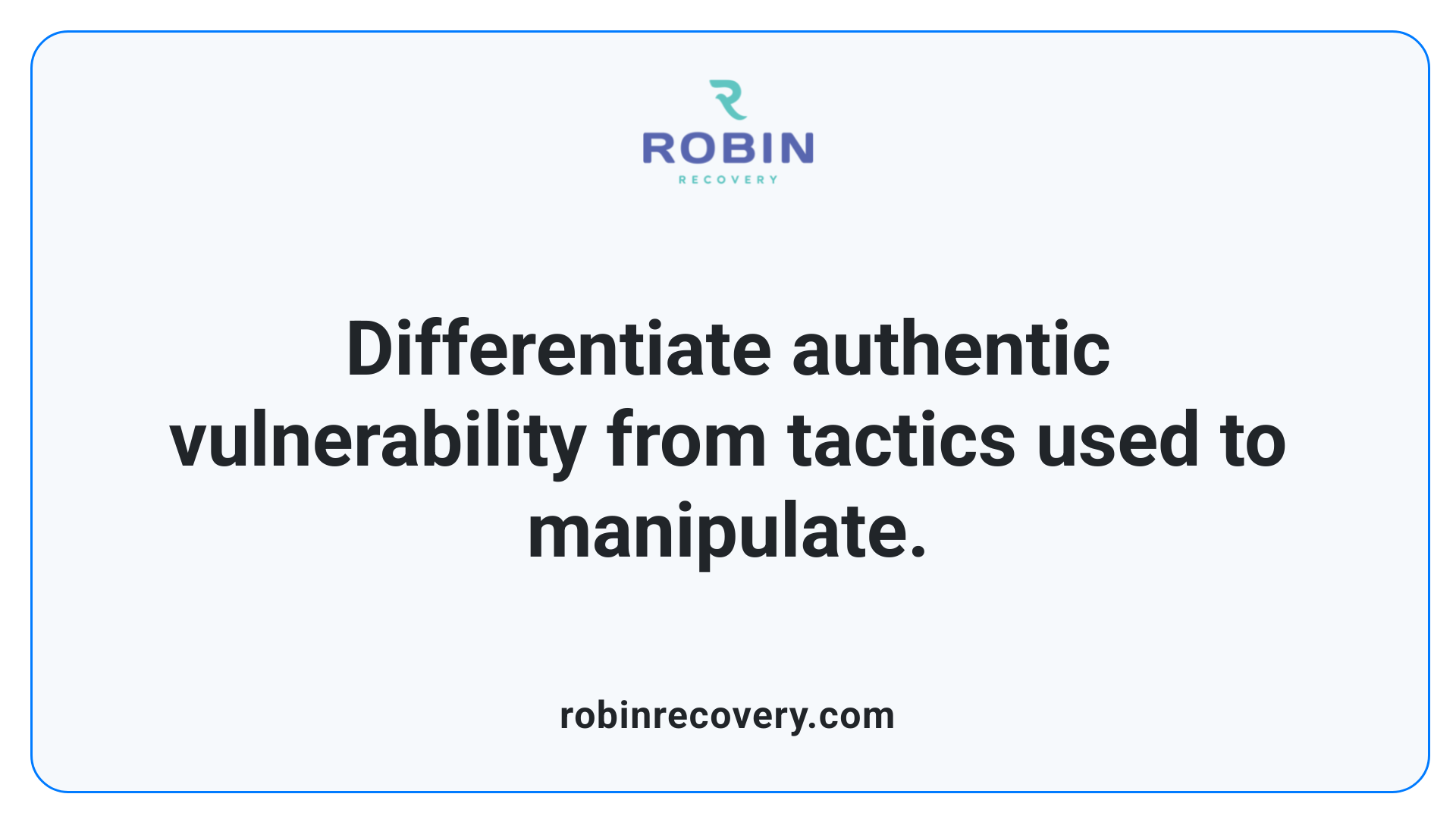
How can you distinguish between genuine victimhood and manipulative victim tactics?
Recognizing whether someone is truly a victim or is playing the victim for manipulative purposes requires careful observation of their behavior and intentions. Genuine victims actively seek understanding, show vulnerability, and are open to feedback. They typically express their hardships honestly and are genuinely trying to cope with difficult circumstances.
In contrast, individuals who manipulate through victimhood often exaggerate or fabricate their problems to gain sympathy or control. They may deny responsibility for their actions, employ tactics like guilt-tripping, or use gaslighting to distort perceptions and evade accountability.
Signs of manipulative victim playing include persistent boundary-crossing, emotional exploitation, and incongruence between their words and actions. They might employ strategies such as DARVO (Deny, Attack, and Reverse Victim and Offender), manipulate others to feel guilty, or spread confusion to maintain control.
Maintaining clear boundaries is essential. Recognizing these patterns helps in differentiating authentic suffering from tactical victim play. Responding calmly and setting limits can prevent manipulation and support genuine individuals in their genuine struggles.
Psychological Roots of the Victim Mentality
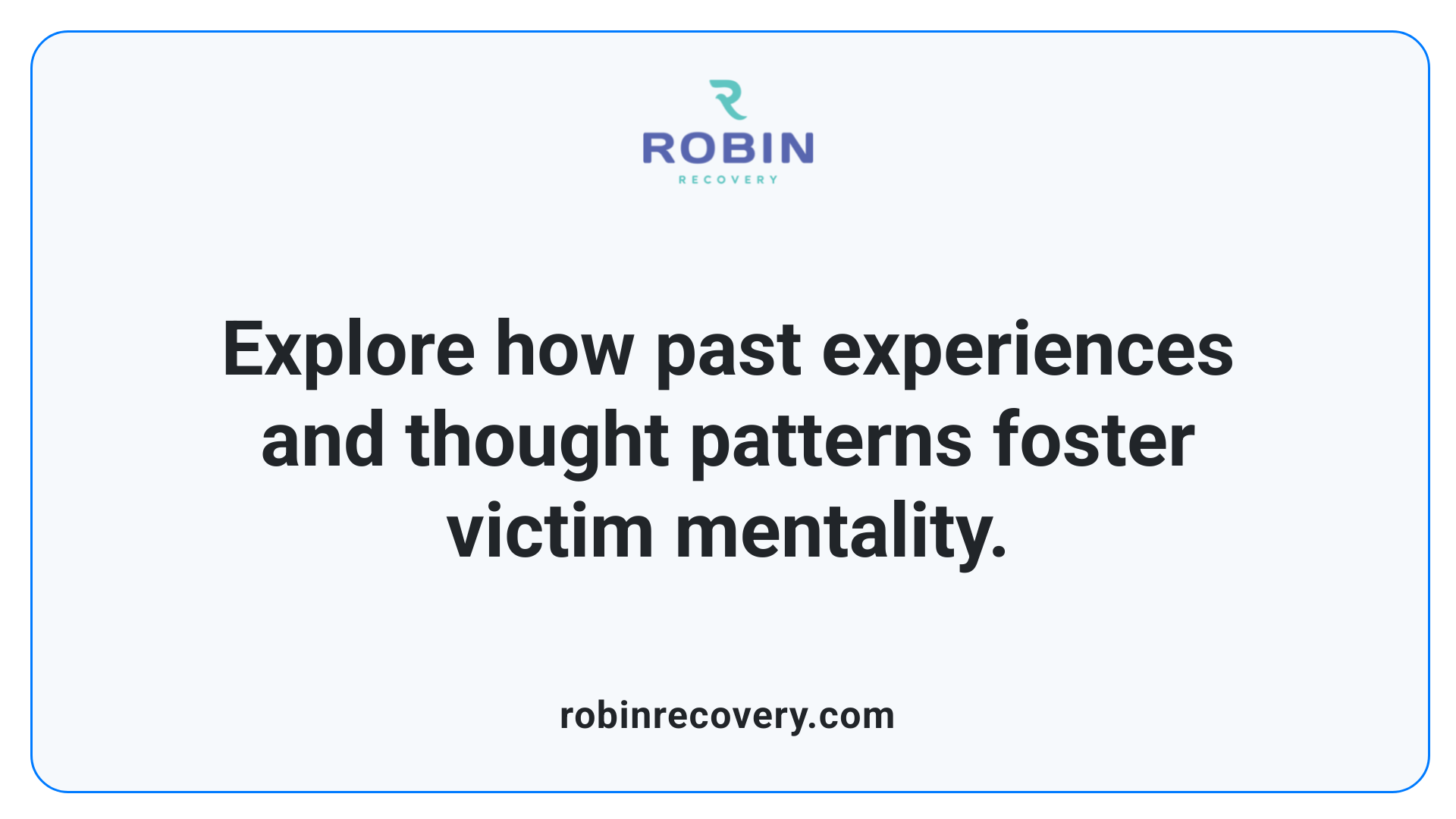
Victim mentality often develops as a response to various psychological influences rooted in early experiences and individual traits. Past trauma and childhood influences are significant contributors; negative experiences, betrayal of trust, or neglect during formative years can shape a person's worldview, making them perceive themselves as powerless or unfairly treated.
Cognitive distortions are also central to reinforcing a victim mindset. These are biased ways of thinking that skew perception of reality, including black-and-white thinking—seeing situations as all good or all bad—catastrophizing, where individuals expect the worst, and rumination, which involves persistent focus on negative thoughts.
Personality traits and disorders further influence susceptibility. Traits linked to interpersonal victimhood (TIV), insecurity, and attachment issues may predispose individuals to see themselves as perpetual victims. Disorders like narcissistic personality disorder and borderline personality disorder often involve manipulative behaviors, blame-shifting, and difficulty accepting responsibility, which align with victim-playing behaviors.
Social and cultural factors also contribute, as societal narratives may sometimes glorify victimhood as part of identity or political strategy. Cultural norms and media portrayals can reinforce the idea that individuals or groups are always oppressed or unfairly treated, which can entrench victimhood.
This complex interplay of trauma, cognitive styles, personality, and societal influences builds a foundation where victim mentality can flourish. Importantly, since this mindset is learned rather than inherent, it is possible to change through therapy, emotional development, and adopting a growth-oriented perspective.
Understanding these psychological roots is crucial for addressing victim mentality effectively. Recognizing how past experiences, thought patterns, and social influences shape this mindset can guide individuals toward healthier coping mechanisms and a more empowered outlook.
Modifying and Overcoming the Victim Mentality
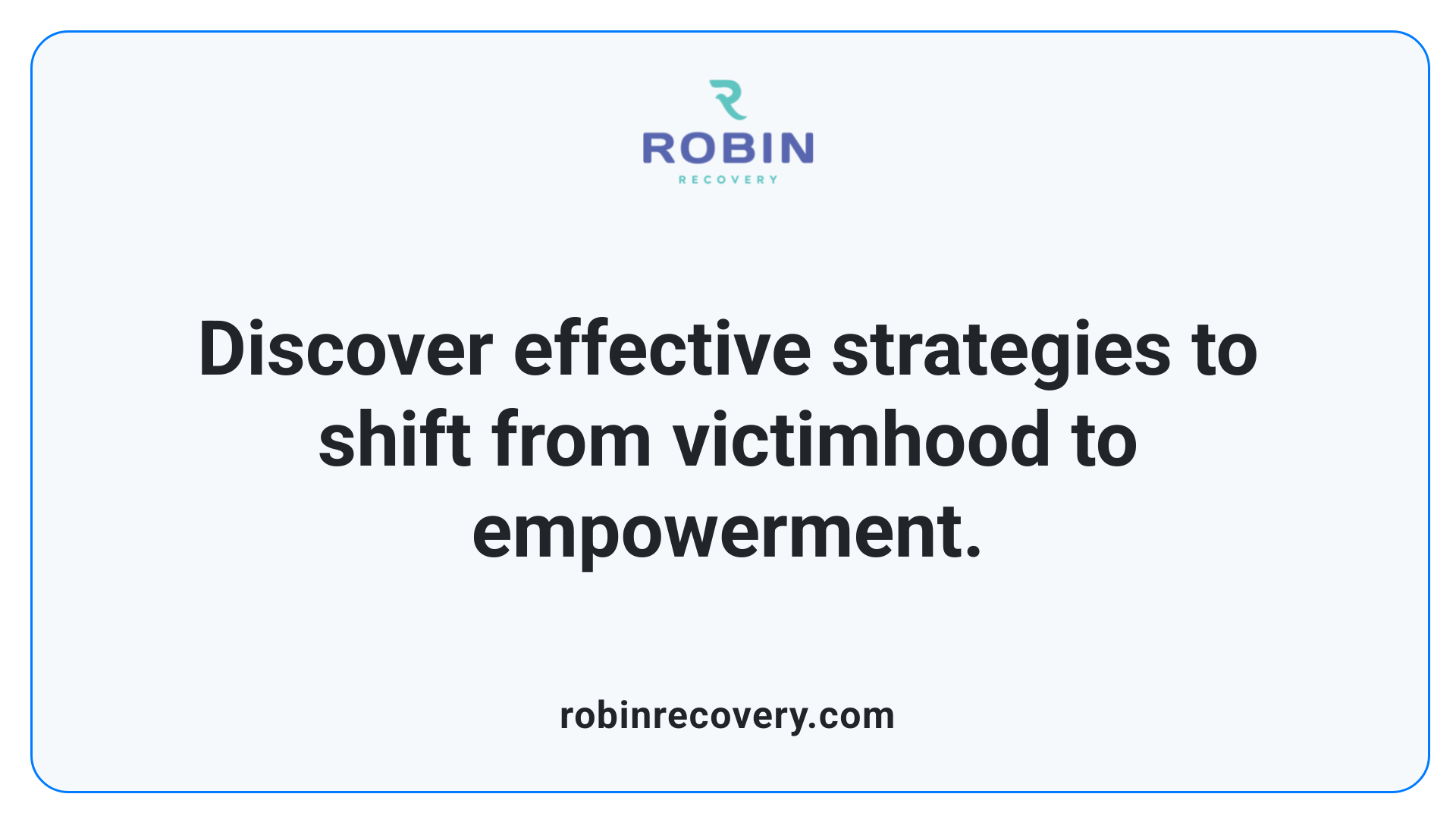
How can a person address and modify a victim mentality or related behaviors?
Addressing and changing a victim mentality requires deliberate effort and self-awareness. The first step is recognizing patterns of blame, helplessness, and avoidance of responsibility. Self-reflection helps individuals identify when they are resorting to victim playing as a defense mechanism or manipulative tactic.
Engaging in therapy or counseling provides valuable guidance in challenging negative thought patterns. Professionals can assist in fostering resilience and a growth mindset—seeing challenges as opportunities to learn rather than insurmountable obstacles.
Practical strategies include reframing negative thoughts, setting achievable goals, and practicing self-compassion. Mindfulness exercises promote present-moment awareness, helping individuals detach from ruminative habits associated with victimhood. Incorporating gratitude and forgiveness can shift focus from feelings of helplessness to empowerment.
Physical practices such as adjusting posture and body language—standing tall, making eye contact, and adopting an open stance—can also improve feelings of control and confidence.
Consistency is crucial. Regular self-awareness, proactive problem-solving, and effort towards personal growth can gradually weaken victim mentality. Over time, these practices foster healthier, more resilient behaviors and a balanced view of one’s circumstances.
Ultimately, overcoming victimhood involves a shift from self-pity to self-empowerment, embracing accountability, and developing internal resources to navigate life's challenges more effectively.
Impacts on Relationships and Personal Development

What impact does playing the victim have on personal relationships and growth?
Playing the victim within personal relationships can create significant barriers to healthy development and intimacy. When someone habitually blames others or external circumstances for their problems, it undermines trust and honest communication. This behavior often leads to emotional volatility and can foster codependent dynamics, where partners feel responsible for soothing or managing the victim’s feelings.
Such a mentality hampers personal growth because it promotes denial of responsibility and avoids confronting issues directly. Individuals who frequently play the victim may experience ongoing conflict, resentment, and insecurity, which prevent genuine problem-solving and mutual understanding.
Relationships may become strained as partners feel burdened or manipulated, and the victim’s focus on their suffering can result in emotional exhaustion. This cycle often intensifies feelings of entitlement and helplessness, making it difficult for both parties to move forward.
Over time, persistent victimhood erodes the foundation of trust and respect. It can trap individuals in a pattern of reliance on external validation, hindering development of resilience and empathy. To foster healthier relationships and personal growth, recognizing and addressing victim-playing behaviors is essential. Shifting towards accountability and constructive communication opens the door to genuine connection and emotional maturity.
Aspect Effect Additional Notes Relationship Dynamics Erodes trust and intimacy Leads to emotional instability and dependency Emotional Toll Increases resentment and insecurity Causes ongoing conflict and emotional fatigue Personal Growth Limits self-awareness and resilience Prevents problem-solving and authentic connection
Understanding the harmful impacts of victim playing can motivate individuals to develop healthier coping strategies and foster more balanced, empathetic relationships.
Moving Toward Enlightenment and Empowerment
Breaking free from the cycle of playing the victim requires self-awareness, accountability, and a sincere desire to change. Recognizing manipulative patterns and distinguishing genuine vulnerability from harmful tactics are crucial steps. Engaging in therapy, practicing self-reflection, and developing resilience help transform a victim mentality into a stance of empowerment and responsibility. Building emotional intelligence, setting healthy boundaries, and fostering genuine empathy can repair damaged relationships and promote personal growth. Ultimately, understanding and addressing the roots of victim playing paves the way for healthier interactions and a more fulfilling, resilient life.
References
- Playing the victim - Wikipedia
- Playing the Victim: Understanding and Stopping the Cycle
- 3 Ways to Tell When Someone Is Playing the Victim
- Victim Mentality: Causes, Symptoms, and More - WebMD
- 14 Clear Signs Someone Is Always Playing the Victim - LifeHack
- Being the Victim Versus Playing the Victim — How to Know Which is ...
- Understanding Manipulation: Spotting and Countering the 'Victim ...
